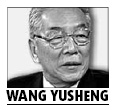Time for US leaders to reflect on actions

The Dalai Lama has continuously begged state leaders to let him visit their countries and meet them so that he could carry on his activities to split the Tibet autonomous region from China. But by doing so he has played into the hands of some foreign countries.
Though the Dalai Lama is acclaimed as a "religious and spiritual leader", he is actually a pawn in the hands of some foreign forces, especially the United States. American presidents have been playing the "Dalai Lama card" even after the end of the Cold War, and Barack Obama is no exception.
At the beginning of this year, Obama announced that the US would sell $6.4 billion worth of arms to Taiwan. He followed it up by meeting the Dalai Lama on Feb 18 despite China's strong opposition and repeated protests. Recent US actions have shown what Obama's "new diplomatic policy" and "smart power" are all about and what his actual policy toward China is.
First, the US government advocates "American values" and claims to pay close attention to human rights and freedom of religion in China. It says the person who Obama met on Feb 18 is Tibet's "religious leader", which only belies his ignorance and arrogance.
Tibet has undergone historical changes in the past 60 years. People in Tibet today lead a much better life and enjoy religious freedom. Though many people, including some American scholars, have accepted the great efforts the central government has made in Tibet, some US leaders still pretend ignorance. Do these leaders mean people in Tibet can enjoy human rights and freedom that the US advocates only if they lead a miserable life, like they did during serfdom?
In fact, this argument is just like the declaration of "human rights above sovereignty" during the Clinton administration. Does the US want to use the guise of "human rights" to interfere in the internal affairs of other countries and establish its hegemony?
The world has been opposing such US attempts for years, but Obama insists on taking them further. His talk of the so-called "religious leader" is nonsense. For US leaders, the Dalai Lama is just a pawn in their wider game to split China.
Second, Washington claims there exists a "tradition" of US presidents meeting the Dalai Lama. Obama did what his predecessors George H.W. Bush, Bill Clinton and George W. Bush had done, it says, and if he had refused to meet the Dalai Lama, he would have drawn the wrath of the advocators of American universalism.
This explanation illustrates America's consistent hegemonic policy, and the limitation and falsity of Obama's "new diplomatic policy" and "reform". Obama has repeatedly vowed to improve Sino-US ties. But when it comes to crucial issues such as arms sales to Taiwan and a meeting with the Dalai Lama, he follows in the footsteps of his predecessors, ignoring the benefits of honoring the promises he has made to China and his US voters.
Third, Washington claimed Obama, during his visit to Beijing three months ago, had talked with Chinese leaders about his meeting with the Dalai Lama. The Chinese leaders, it said, agreed that Sino-US relations "should be and already are mature enough" not to allow the Obama-Dalai meeting to undermine them.
This is a quibble, wishful thinking on the part of the US. During Obama's visit to Beijing, Chinese leaders enumerated the country's solemn stand on the Dalai Lama: China resolutely opposes leaders or government officials of any country having contact with the Dalai Lama. They also made it clear that the US should not allow Tibet separatists to use its territory to carry out anti-China activities. The fact is that Obama has ignored China's protests. And it is ridiculous for his administration to try and prove that the facts are to the contrary.
Admittedly, the Sino-US ties are one of the most significant bilateral relationships in the world. China still hopes the two countries will bear their overall interests in mind, respect each other, take mutually beneficiary steps and establish a positive and all-round cooperative relationship. The Obama-Dalai Lama meeting was against the commitment the US president made to China during his visit to Beijing, and it has severely damaged Sino-US relations.
When it comes to core interests, every country, including China and the US, has its bottom line. It is America's wishful thinking that it can infringe upon other countries' core interests randomly while claiming not to have harmed bilateral relations. Such things have happened in the past, but the times have changed now. It is high time American leaders and the advocates of "American values" reflected upon their actions.
The author is a Beijing-based researcher on international studies and former Chinese diplomat.
(China Daily 02/23/2010 page9)














